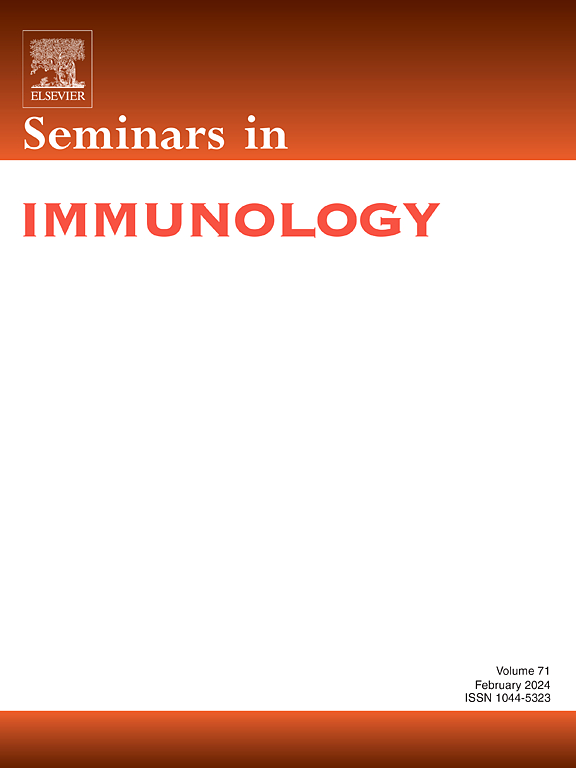局部和细胞内在补体:癌症进展的新参与者
IF 7.4
2区 医学
Q1 IMMUNOLOGY
引用次数: 0
摘要
作为先天免疫的关键组成部分,补体系统在癌症中扮演着一个矛盾的角色,既是肿瘤抑制因子,又是肿瘤启动因子。虽然传统上认为它是细胞外免疫功能,但最近的发现强调了肿瘤进展中非典型的细胞内作用。这些发现挑战了补体活性局限于细胞外空间的传统观点,并揭示了其对肿瘤增殖、免疫逃避和转移的意想不到的影响。肿瘤利用局部补体激活创造免疫抑制微环境,经常上调调节蛋白以逃避补体介导的细胞毒性。补体蛋白还可以通过细胞外信号传导和细胞内与致癌途径的相互作用促进肿瘤生长和治疗抵抗。细胞内补体系统或“复合体”的新概念进一步表明,它在细胞代谢、免疫调节和应激反应中的作用。尽管有这些见解,关键的挑战仍然存在于定义细胞特异性补体功能和区分自分泌、旁分泌和细胞内信号。目前的研究严重依赖于基因表达数据,这并不能完全反映蛋白质的活性。基因编辑、单细胞技术和细胞内补体抑制剂的进展对于阐明补体在癌症中的复杂作用和确定新的治疗策略至关重要。本文章由计算机程序翻译,如有差异,请以英文原文为准。
Local and Cell-intrinsic complement: The new player in cancer progression
The complement system, a key component of innate immunity, has a paradoxical role in cancer, acting both as a tumor suppressor and a promoter. While traditionally recognized for its extracellular immune functions, recent discoveries highlight non-canonical, intracellular roles in tumor progression. These findings challenge the conventional view that complement activity is confined to the extracellular space and reveal its unexpected influence on tumor proliferation, immune evasion, and metastasis. Tumors exploit local complement activation to create an immunosuppressive microenvironment, often upregulating regulatory proteins to evade complement-mediated cytotoxicity. Complement proteins can also promote tumor growth and therapy resistance through extracellular signaling and intracellular interactions with oncogenic pathways. The emerging concept of an intracellular complement system, or "complosome," further suggests roles in cell metabolism, immune modulation, and stress responses. Despite these insights, key challenges remain in defining cell-specific complement functions and distinguishing autocrine, paracrine, and intracellular signaling. Current studies rely heavily on gene expression data, which do not fully reflect protein activity. Advances in gene editing, single-cell technologies, and intracellular complement inhibitors will be critical for clarifying the complex roles of complement in cancer and identifying new therapeutic strategies.
求助全文
通过发布文献求助,成功后即可免费获取论文全文。
去求助
来源期刊

Seminars in Immunology
医学-免疫学
CiteScore
11.40
自引率
1.30%
发文量
50
审稿时长
89 days
期刊介绍:
Seminars in Immunology is a specialized review journal that serves as a valuable resource for scientists in the field of immunology. The journal's approach is thematic, with each issue dedicated to a specific topic of significant interest to immunologists. It covers a wide range of research areas, from the molecular and cellular foundations of the immune response to the potential for its manipulation, highlighting recent advancements in these areas.
Each thematic issue is curated by a guest editor, who is recognized as an expert in the field internationally. The content of each issue typically includes six to eight authoritative invited reviews, which delve into various aspects of the chosen topic. The goal of these reviews is to provide a comprehensive, coherent, and engaging overview of the subject matter, ensuring that the information is presented in a timely manner to maintain its relevance.
The journal's commitment to quality and timeliness is further supported by its inclusion in the Scopus database, which is a leading abstract and citation database of peer-reviewed literature. Being indexed in Scopus helps to ensure that the journal's content is accessible to a broad audience of researchers and professionals in immunology and related fields.
 求助内容:
求助内容: 应助结果提醒方式:
应助结果提醒方式:


